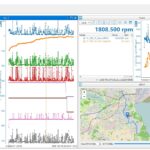Choosing the right OBD2 scanner can be overwhelming with the vast array of options available. This guide breaks down the Different Kinds Of Obd2 Scanners, helping you find the perfect tool for your needs, whether you’re a DIY enthusiast or a professional mechanic.
Understanding OBD2 Scanner Types
OBD2 scanners vary in complexity and functionality, catering to diverse needs and budgets. Here’s a detailed look at the most common types:
1. Basic OBD2 Code Readers
These entry-level scanners are designed to read and clear basic engine trouble codes, illuminating the cause of a check engine light. They’re ideal for simple diagnostics and identifying common engine issues.
2. Bluetooth/WiFi OBD2 Scanners
These scanners connect wirelessly to your smartphone or tablet, providing real-time data and diagnostics via a dedicated app. They offer convenience and portability, allowing you to monitor various vehicle parameters.
3. OBD2 Gauges and Monitors
These tools display real-time data from various sensors, such as temperature, pressure, speed, and fuel consumption. They offer continuous monitoring of critical vehicle parameters, enhancing driving safety and efficiency.
4. Multi-System OBD2 Scanners
Going beyond basic engine diagnostics, these scanners can access multiple vehicle systems, including ABS, SRS, transmission, and body control modules. They offer comprehensive diagnostic capabilities for more complex troubleshooting.
5. Single-Make OBD2 Scanners
Designed for specific car brands, these scanners provide in-depth diagnostics and advanced functions tailored to a particular manufacturer’s vehicles. They are ideal for specialized workshops or dedicated brand enthusiasts.
6. Professional OBD2 Scanners
These high-end scanners offer comprehensive diagnostics, advanced coding and programming capabilities, and extensive vehicle coverage. They are essential tools for professional mechanics and workshops dealing with complex repairs.
7. Service Reset OBD2 Scanners
These specialized scanners focus on performing service-related tasks, such as oil resets, EPB resets, battery registration, and DPF regeneration. They streamline routine maintenance procedures.
8. OBD1 to OBD2 Adapters
These adapters bridge the gap between older OBD1 systems and modern OBD2 scanners, enabling diagnostics on vehicles with legacy systems.
Choosing the Right OBD2 Scanner
Selecting the right scanner depends on your specific needs and budget. Consider the following factors:
- Vehicle Compatibility: Ensure the scanner supports your vehicle’s make, model, and year.
- Diagnostic Needs: Determine the level of diagnostic detail required.
- Budget: Scanners range from affordable code readers to expensive professional tools.
- Features: Consider features like live data streaming, bi-directional control, and special functions.
By understanding the different kinds of OBD2 scanners available, you can confidently choose the tool that best meets your automotive diagnostic requirements.
